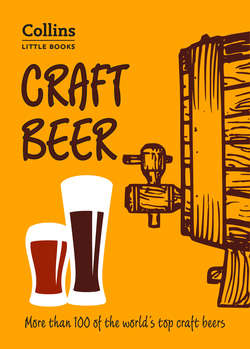Читать книгу Craft Beer: More than 100 of the world’s top craft beers - Dominic Roskrow - Страница 6
ОглавлениеWhat is a craft beer?
In late 2017 American organisation the Brewers Association (BA), publishers of craftbeer.com, launched a campaign to crowdfund the purchase of Anheuser-Busch, the makers of Budweiser.
The BA needs to raise a highly improbable – bordering on impossible – $213 billion, and while the campaign, called Take Craft Back, has its tongue firmly in its cheek, the underlying message is a very serious one: craft beer is under threat from global corporations intent on tapping into the large pool of beer drinkers, while stepping on anyone who gets in their way.
By the end of 2017 Anheuser-Busch had bought six craft brewers and was making inroads into major distribution channels. Other international drinks companies have also acquired craft breweries. Their beers are presented as if they are still made in a small farm shed in Michigan, but they are a con. Often they taste nothing like the original version – and this is not a good thing.
So what exactly constitutes a craft or microbrewer? This is not an easy question to answer.
The standard dictionary definition of craft is ‘a skill, particularly in a trade’. This definition works for craft brewing, but it begs the question: isn’t all beermaking a craft under this definition?
Wikipedia defines a microbrewery or craft brewery as ‘one that produces small amounts of beer, typically much smaller than large-scale corporate breweries, and is independently owned. Such breweries are generally characterised by their emphasis on quality, flavour and brewing technique.’
This definition is grossly inadequate and incomplete; the last part is based on subjective evaluation, and there can be no place for that in a watertight definition. And what constitutes small? An American brewer and a British brewer may have very different ideas of what the word means, and one person’s shed may be another’s mansion.
More importantly, if a brewery grows due to consumer demand, but continues to make beer the same way but just on a bigger scale, does it then cease to be a craft brewery? And at what size does this happen?
So size can’t be at the core of our definition of what craft brewing is. And although the word ‘craft’ implies an aspect of quality, our definition can’t be totally about quality either. Big doesn’t necessarily mean bad, as fans of Marston’s Pedigree or Guinness will attest. Conversely, it’s highly unlikely that the retired New York stockbroker brewing his first golden ale will hit on the perfect beer at his first attempt. He will almost certainly not make anything nearly as good as the makers of Adnams, Speckled Hen and many other great beers, perfected by skilled craftsmen over generations.
Wikipedia also has a definition for a microdistillery, ‘… a small, often boutique-style, distillery established to produce beverage grade spirit alcohol in relatively small quantities.’
This is more helpful, because of the word ‘boutique’, which can be used to mean ‘a business serving a sophisticated or specialised clientele’.
This is much better. The definition nods toward the concept of size but makes it an issue of demand as well as supply. The word ‘business’ implies a level of care and professionalism, and by using the words ‘sophisticated and specialised clientele’ some concept of quality is brought into the frame. Not only that, but there is a strong implication that if there was a surge in demand from that sophisticated and specialised clientele, the business would still be a boutique one, even if it correspondingly grew to serve the increased demand.
This works for a definition of craft or microbrewing, too. If someone produces a beer that becomes popular so that the business has to grow to meet demand then, under our definition, this remains a craft operation, providing no compromise is made on the quality of their product, and there is no sell-out of the producer’s original aspirations or ideals.
Perhaps, then, a craft brewery can be defined as ‘any brewery that starts out as an independent boutique operation with the intention of making a bespoke and individual beer, and which stays true to the ideals of creating premium and quality beers no matter what happens to it.’
Under this definition it does not matter whether you’re brewing in a traditional way or attempting something innovative. Nor whether you’re brewing by hand on ancient equipment or have a state-of-the-art microbrewery. And it doesn’t matter what ingredients you decide to use as long as the purpose is to enhance and enrich your beer, and not to save money or cut corners.
Glance at many of the websites of the craft brewers featured in this book and they will have a statement about what they set out to achieve with their beers, or they describe how they came into being. In all cases they would fit the definition above. Anheuser-Busch clearly does not.
